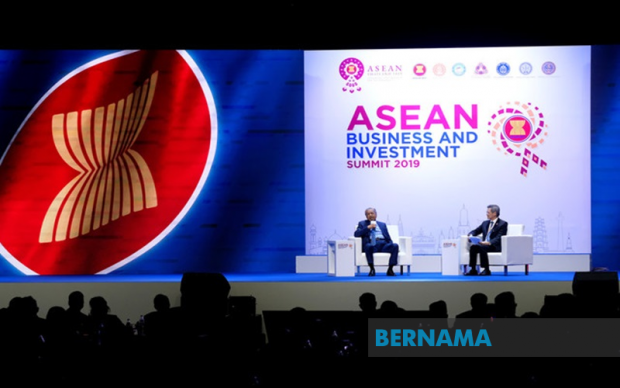
Mahathir: If they do something not nice to us, we have to be un-nice to them

Bangkok: When Dr Mahathir Mohamad spoke at a dialogue session at the ASEAN Business and Investment Summit (ABIS) last Saturday on the sidelines of the just concluded 35th ASEAN Summit here, he called for the 10-ASEAN nations to speak with one voice on the global stage to avoid being bullied, by developed nations in particular.
The outspoken and no-nonsense Malaysian prime minister made ASEAN’s stand very clear – ASEAN, with its 650 million population is a big global market and does not want to go into a trade war.
“If they do something not nice to us, we have to be un-nice to them,” said the statesman during a 45-minute dialogue session held at the IMPACT Exhibition and Convention Centre at Muang Thong Thani, Nonthaburi.
The 94-year-old politician’s sharp and analytical views on various current issues again captured the participants’ attention.
“I love your prime minister.” “He is a sharp and outstanding leader” were the responses that came from a cross-section of local and foreign media covering the dialogue session moderated by ASEAN Business Advisory Council chairman Arin Jira.
Dr Mahathir’s views on the US-China trade war at the ABIS 2019 were frank and could not be sidestepped. Although not officially remarked, many leaders to the Summit had expressed concern over its damaging impact on the global economy.
“They felt that the prolong spat is disrupting the growth of trade and economy in the region. They would like to have a peaceful world where people can trade with everyone. I hope it can be resolved one way or another,” Dr Mahathir had said, adding that trade nations should return to the World Trade Organisation (WTO) principles.
Dr Mahathir’s views were also shared by Chinese premier Li Keqiang, who at the ASEAN-China Summit had highlighted the need to uphold multilateralism and free trade in the wake of the mounting downward pressure on the global economy and new challenges, China state-owned news agency, Xinhua reported.
The second and final summit hosted by Thailand as this year’s ASEAN Chair, also marked a significant accomplishment with the conclusion of the Regional Comprehensive Economic Partnership (RCEP) negotiations by all participating countries on Monday, leaving India out of the deal, after seven years of negotiations.
After 28 rounds of negotiations and 18 ministerial meetings spanning about seven years, the negotiations were successfully wrapped up at the 35th ASEAN Summit. The deal is expected to be signed next year.
The 15-RCEP participating countries – all 10 ASEAN countries and five non-member states – China, Japan, South Korea, Australia and New Zealand have concluded text-based negotiations for all 20 chapters and essentially all their market access issues; and tasked legal scrubbing by them to commence for signing in 2020.
India has decided to pull out for now over concerns of several terms in the deal including protection of its domestic industry and influx of goods imported from China in its market.
With India onboard, RCEP would have been the largest trade pact in the world, accounting a total of US$49.5 trillion in combined GDP and covering half of the global population.
However, without India, an analyst believed it is still the largest to date, albeit reduced in coverage and breadth.
“Based on 2018 figures, RCEP-15 will encompass about 29 per cent of world GDP (about 32 per cent with India) and cover about 30 per cent of the world population (about 47 per cent with India),” Calvin Cheng, researcher in economics at the Institute of Strategic and International Studies (ISIS) Malaysia told Bernama.
RCEP was initiated in 2012 with the aim of providing more seamless market access including to standardise tariffs among participating countries.
Cheng also believed that it is better to move ahead by concluding the talks and have the possibility of India joining at a later date than to get a trade deal blocked.
“Much of the issues India has with the RCEP seem to me to be structural at this point,” he said.
Meanwhile, ASEAN chairman, Thailand Prime Minister General Prayuth Chan o-cha said most of the goals cannot be fully realised in a single year.
“Therefore, Thailand, has taken forward important initiatives from previous years, be it the Philippines’ initiative to engage the world or Singapore initiative for resilience and innovation to drive forward these ASEAN agendas, in order to achieve concrete outcomes.
“Thailand has laid a foundation for an ASEAN which is sustainable in all dimensions. I am confident that Vietnam will successfully and efficiently carry forward the ASEAN Chairmanship from Thailand and realise ASEAN’s dream of promoting partnership and maintaining peace, freedom, security and prosperity in the region,” he said at the closing ceremony.
Vietnam will formally take over the ASEAN chair from Jan 1, 2020.
BERNAMA


